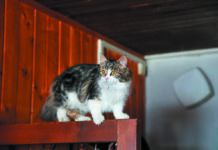Q: My cat’s breath has become kind of unpleasant in his old age. I’ve been assuming it’s just part of the aging process, but a neighbor said I should get it checked out. I hate to run to the vet for every little this and that. Please settle whether an appointment is necessary.
Roz GalettiSilver
Spring, Maryland
Dear Ms. Galetti,
A: We think checking into this is in your cat’s best interest. Bad breath, medically termed halitosis, is more common in older cats, but it’s not a normal sign of aging. It means something is wrong and requires veterinary evaluation. Most of the time the cause of the bad breath is right in the mouth — either gum disease or perhaps an infection, ulceration, or tumor. But sometimes the source of the unpleasant breath has an origin elsewhere in the body. There could be a problem in the nasal passages, or even as far away from the mouth as the liver or kidneys. The sooner the cause of the changed breath can be found, the better the chance to tend to the problem with fewer complications — and for less money.
Thanksgiving no-no’s
Q: Is it okay to give my cat a tiny bit of Thanksgiving dinner? She smells the turkey and gravy and goes wild.
Pia Collins,
Boulder, Colorado
Dear Ms. Collins,
A: A tiny bit of plain turkey used as a garnish over her own food is fine. You probably should hold the gravy, which is very fatty and could prove too much for her sensitive stomach. And any dish made with onion and garlic — such as the stuffing — should be off-limits. Onions and garlic (and scallions) can damage a cat’s red blood cells, causing anemia. Even a small amount can cause harm — not just anemia but also abdominal discomfort (cramps), vomiting, and other signs of gastrointestinal upset.
To bleach or not to bleach the litter box?
Q: What’s the best way to clean the litter boxes? Is sterilizing them with boiling water a good idea? What about using bleach on them?
I want the boxes to be clean and safe and my house odor-free. Thanks for any info you can provide.
Tanya DeKona
Columbia, Maryland
Dear Ms. DeKona,
A:Your best bet is to wash your litter boxes once a week with hot, soapy water that does not have a scent. Scents in detergents that you find pleasing may be abhorrent to your pet. You don’t need to boil the water. Hot water from the tap will do.
Bleach is not the best idea. There’s ammonia in your pet’s urine, and if any residual urine in the box reacts with the active ingredient in chlorine bleach — sodium hypochlorite — toxic vapors can be produced that could potentially make you start coughing and feeling nauseated. Some people’s eyes also turn watery, and they experience irritation in their nose and throat. If you feel you must disinfect with bleach (truly not necessary unless perhaps your cat goes outside and may pick up pathogens), thoroughly empty and wash the litter box first as directed above. That way there’ll be no urine left over to mix with it. Make sure to rinse the box very thoroughly afterwards so no bleach ends up on your pet’s paws — and in her mouth when she’s self-grooming.




